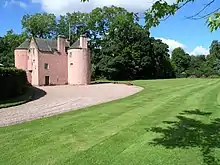
Terpersie Castle (originally built as Dalpersie House) is a 16th-century tower house in Tullynessle, Aberdeenshire, Scotland, located 5 kilometres (3.1 mi) north-west of Alford. It is protected as a category A listed building.[1]
History
The small Z-plan manor tower house was constructed in 1561 by the Gordon family. On May 16, 1645, a Sunday, Major Baillie on campaign against Montrose, burnt the house and plundered and destroyed the surrounding area before the arrival of Lord Balcarres.[2]
Charles Gordon of Terpersie was an officer in Gordon of Glenbuchat's Regiment.[3] He was said to have been captured following the '45 Rising hiding in a recess in the upper part of the castle's roof.[4] Gordon was executed at Carlisle on 15 November 1746 aged around 60 years.
In 1665 it was restored after burning down. After 1885 it was abandoned, and stood in ruins during most of the 20th century. In the 1980s the castle was restored as a residence by architects William Cowie Partnership.[5]
Characteristics
Terpersie is one of the earliest known Z-plan manor-houses, defined as a rectangular main block with towers at opposite corners. The main block of Terpersie measures around 8.5 by 5.5 metres (28 by 18 ft), with two round towers of 5.2 metres (17 ft) in diameter.[1]
References
- 1 2 Historic Environment Scotland. "TERPERSIE CASTLE (Category A Listed Building) (LB13879)". Retrieved 30 December 2018.
- ↑ Spalding, John (1792). The history of the troubles and memorable transactions in Scotland, from the year 1624 to 1645. Vol. 2. T. Evans, Paternoster Row, London. p. 298. Retrieved 18 February 2018.
- ↑ No Quarter Given, The Muster Roll of Prince Charles Edward Stuart's Army 1745-45 by Livingstone, Aikman and Hart (2001)
- ↑ Billings, Robert William (1852). The baronial and ecclesiastical antiquities of Scotland (1852) (Volume 2 ed.). p. 1. Retrieved 18 February 2018.
- ↑ Historic Environment Scotland. "Terpersie Castle (17704)". Canmore. Retrieved 30 December 2018.
External links
- Simpson, W. D. (1942). "Two Donside Castles" (PDF). Proceedings of the Society of Antiquaries of Scotland. 76: 93–103.